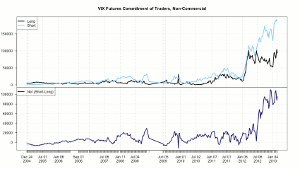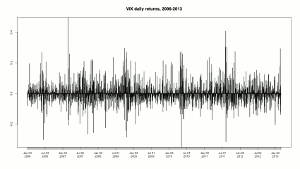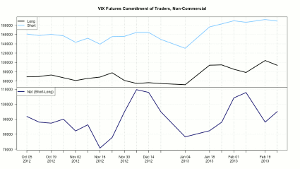The media love dire predictions since those stories get lots of attention, but sometimes they should examine their premise for logic flaws first, notes Jared Woodard of CondorOptions.com.
Since early 2012, hedge funds and other traders have been short S&P 500 volatility via VIX futures in sizes not seen before. A story from IFR was syndicated across Reuters last week with a rather provocative lede:
Hedge funds have levered up their short plays on VIX futures to such extreme levels that the market is poised for a significant short squeeze.
For context, here is the positioning in VIX futures by non-commercial traders since the product was listed in 2004.

VIX Futures Non-Commercial Commitment of Traders, 2004-2013. Source: CFTC*
Click
to Enlarge
The story is not wrong. Net positioning (short minus long exposure) has climbed steadily since last June, and on Feb. 19, short positioning reached a new all-time high. I'll send you over in a minute because the second half of the story has some thoughtful quotes, but first let's tackle this "short squeeze" idea.
Assume that there are many weak-hand managers who have piled into short VX positions for whatever reasons, or none, such that they will race for the exit at the first sign of trouble. The short squeeze theory is that this rush to cover short VX contracts will feed into the rest of the market and exacerbate a selloff, the way that front month short gamma holders can turn moderate swings in an underlying on expiration Friday into large swings as they close out threatened positions.

VIX Index Daily Returns, 2006-2013. Source: Yahoo!
Click
to Enlarge
The problem with this theory is that we've just seen an ideal situation for VX short-covering and no one was interested in dumping their positions. The S&P 500 decline on Feb. 25 was not that remarkable, but it was the most downside volatility we've seen since last November, and options markets reacted accordingly. Arguably, they overreacted: the change in spot VIX was the largest single-day move in years (cf. above). If VX futures shorts were going to be easily spooked, then we would expect to see a sharp decline in net short exposure in the week's Commitment of Traders report. But: no.

VIX Futures Non-Commercial Commitment of Traders, 2012-2013. Source: CFTC
Click
to Enlarge
Short positions dipped by 3,318 contracts, but long positions fell by 10k contracts, such that net short positioning as of Feb. 26, the day after the market selloff, was actually higher than the week before.
Obviously, there is still plenty of room to argue that it will be the next big selloff that causes a VIX futures short squeeze (wait, no, the next one), but it seems that if VIX futures traders were going to panic and scramble, they would have done so last week.
There is a gap in CFTC data from December 2008 to June 2009.
By Jared Woodard of CondorOptions.com










